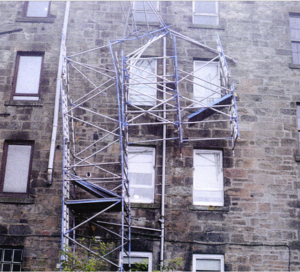Scaffolding company fined after scaffold collapse causes employee to fall
JR Scaffold Services Ltd has been fined after an employee fell eight metres to the ground and sustained severe injuries when the cantilever section of a scaffold he was erecting collapsed.

Glasgow Sheriff Court heard that, on 2 September 2016, work was undertaken at a four-storey property in Alexandra Parade in Glasgow to erect a tower scaffold to repair a roof. An employee was fitting toeboards to a cantilever section attached to the tower scaffold and the tower partially collapsed causing him to fall eight metres to the ground below.
An investigation by the Health and Safety Executive (HSE) found the company had carried out a risk assessment and method statement for the initial work and erected an eight metre high tower to allow for access to the roof. The tower had been erected in the wrong place. It was decided that, rather than disassemble and reassemble in the right place, a cantilever section would be added. There was no design for the cantilever section and due to there being insufficient anchor ties available on site, it was decided to support the cantilever by splicing the frame of the scaffold. There was also no ballast/counterweight which meant that the top section of the tower was unable to support the weight of the cantilever. When an employee stood on the cantilever section to fit toeboards the top section of the scaffold and cantilever section collapsed.
JR Scaffold Services Ltd, Cardea House, Sandyford Road, Paisley pleaded guilty to breaching Section 2(1) of the Health and Safety at Work etc Act 1974 and was fined £5,000.
Speaking after the hearing, HSE inspector, Helen Diamond said “Falls from height remain one of the most common causes of work-related fatalities in Britain and the risks associated with working at height are well known.
“This incident could have been avoided if the task was properly planned, the existing scaffold was correctly positioned and securely attached to the tenement and any cantilever section properly designed and attached correctly to the main scaffold.
“Companies should be aware that HSE will not hesitate to take appropriate enforcement action against those that fall below the required standards.”
Notes to Editors:
- The Health and Safety Executive (HSE) is Britain’s national regulator for workplace health and safety. We prevent work-related death, injury and ill health through regulatory actions that range from influencing behaviours across whole industry sectors through to targeted interventions on individual businesses. These activities are supported by globally recognised scientific expertise. www.hse.gov.uk
- More about the legislation referred to in this case can be found at: www.legislation.gov.uk/
- HSE news releases are available at http://press.hse.gov.uk
The post Scaffolding company fined after scaffold collapse causes employee to fall appeared first on HSE Media Centre.